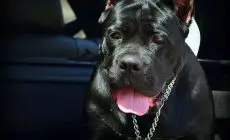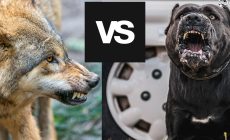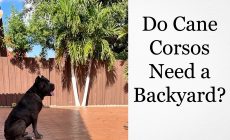Veterinarians explain that vomiting is the body’s natural process for eliminating toxic chemicals from the stomach.
If your Cane Corso is puking, it can be frightening and stressful; however, there could be a variety of causes.
The easiest method to figure out what went wrong with your Cane Corso is to visit with an expert as soon as possible and have them diagnose the problem.
But if you’re just interested in the possibilities, below are some of them.

1: Dietary indiscretion
Some dogs develop a bad habit of eating uncommon items such as garbage or foreign objects, as well as meals that they would not ordinarily take.
If you’ve found your Cane Corso chewing on non-food materials like plastic or rubber, it’s possible that he has a dietary indiscretion problem.
The problem is that dogs with this habit end up eating something that irritates their stomachs and makes them sick.
It’s likely that your Cane Corso ate something that wasn’t digestible and made him sick, which is why he’s vomiting.
If he has consumed non-food items, he may exhibit symptoms such as difficulty defecating and decreased appetite.
Meet with an expert as soon as feasible in this scenario.
2: Gastroenteritis
Gastroenteritis is a common health issue in dogs. It is an inflammation of the gastrointestinal tract (stomach and intestines) caused by bacterial, viral, or parasitic infections, drugs, or even new meals.
Gastroenteritis can result in abdominal pain, diarrhea, and vomiting.
The majority of gastrointestinal infections are minor and normally go away on their own within a few days.
However, if your Cane Corso’s condition worsens or he exhibits other symptoms such as lethargy, a reduced appetite, or a low-grade fever, call a veterinarian right once.
3: Heatstroke
Cane Corsos, due to their huge bodies, are prone to heatstroke.
Symptoms of heatstroke include vomiting, profuse drooling, panting, trouble breathing, and lethargy.
Cane Corsos are not meant to live outside; they may withstand extreme weather for a while, but if you leave them outside every day, especially if your area is quite humid, your Corso will likely suffer from heatstroke.
If your Cane Corso shows indications of heatstroke, move him to a shaded and cool spot.
To avoid shock, immediately pour cool (not cold) water over your Corso. Tap water (15-16°C) has been found to be the most effective at cooling dogs with heat-related disorders.
4: Pancreatitis
The pancreas is a very important organ since it produces hormones like insulin and enzymes that aid in food digestion.
Pancreatitis is the term for the inflammation that develops in a dog’s pancreas.
Unfortunately, pancreatitis affects dogs frequently and can strike any breed.
Numerous health problems, including persistent vomiting, loss of appetite or refusal to eat, weakness, and dehydration, can be brought on by pancreatitis.
See a specialist as soon as you notice symptoms because this condition can cause your Cane Corso to become extremely frail.
5: Toxic Ingestion
Young Cane Corsos have a tendency to eat new things just to explore the world and get to know how things work, but sometimes they end up eating something that is not suitable for their bodies.
Maybe your Cane Corso ate something that is toxic to his body, like certain plants, human medications, or household chemicals.
Eating anything that is toxic can result in vomiting, diarrhea, dehydration, hyperactivity, and fever.
6: Motion sickness
Motion sickness is another common problem in dogs and can cause vomiting, excessive drooling, and panting.
If your Cane Corso only pukes while on car rides or after car rides, maybe he is prone to motion sickness.
Dogs can’t tell what they are feeling; you have to find it out, notice if he shows symptoms of motion sickness while he rides, and once you are confirmed, take steps to reduce motion sickness in your Cane Corso.
In fact, there are many things that can help decrease the motion sickness of your dog. You may read this guide!
7: Inflammatory bowel disease (IBD)
Inflammatory bowel disease (IBD) is the result of a specific reaction to chronic intestinal irritation. IBD can damage the digestive tract, preventing food from being absorbed properly.
It might cause vomiting, diarrhea, decreased appetite, and weight loss.
Most Cane Corsos are not susceptible to this disease, but it is always possible. If you see any signs of IBD, call your veterinarian.
How To Keep Your Cane Corso From Throwing Up
If your Cane Corso vomit up every time he eats, or if the color of the puke is unusual (such as red), you should consult a veterinarian.
Do not rely on the internet because bloggers can only provide information and tips; a precise remedy can only be shared after diagnosing the problem.
However, for informational purposes, the following are some of the things you can do to maintain your Cane Corso healthy and prevent him from vomiting.
- Feed smaller, frequent meals
Instead of feeding your Cane Corso a single large meal, divide it into multiple portions. Large meals may cause dogs to bloat and puke. Large meals can also take longer to digest.
- Limit table scraps and human food
Give your Cane Corso no table scraps or human food for a while as this can upset their stomach and make them throw up.
- Prevent access to garbage and foreign objects
To prevent your Cane Corso from consuming anything that could irritate their stomach, keep your house and outdoors tidy.
- Keep Toxic Foods Away From Him
Dogs are toxic to things like chocolate, raisins, onions, candies, chewing gum, and garlic; try to avoid giving your dog these foods.
- Regular Exercise
Despite their size, Cane Corsos require regular playtime or exercise in order to maintain their health and fitness. Exercise may lessen the likelihood of vomiting and aid in improved food digestion.
What Can I Give My Cane Corso To Stop Throwing Up?
To treat dog vomiting caused by stomach inflammation, bland food (such as cooked chicken, white fish, white rice, sweet potato, or a veterinary-prescribed diet) and anti-nausea medicine are commonly utilized.
Remember, if your Cane Corso exhibits other symptoms such as fever, lethargy, loss of appetite, gastrointestinal pain, diarrhea, or dehydration in addition to vomiting, call a veterinarian right once.
I hope you liked this post.
Thanks for reading!







